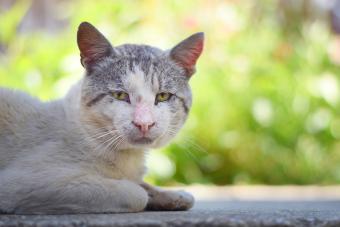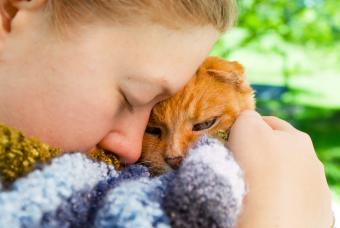
Recognizing the signs a cat is dying of old age can help you make the best choice for your pet. Weight loss, an unpleasant odor, and other symptoms of aging can indicate your cat may be approaching the end stage of its life, but the severity of the symptoms can help you determine how much time is left.
Indications a Cat Is Dying of Old Age
It is not so much old age, but more typically the complications associated with failing organ systems, that kill a cat. These types of diseases are more common during the feline geriatric years. The symptoms of aging and death are similar. However, it will be the frequency and severity of these conditions that determine your cat's overall state.
How to Tell if a Cat Is Dying
The Home to Heaven pet hospice service lists several signs that indicate a cat may be within a few days to a few hours of death. These include:
-
Weight loss progressing to emaciation
-
Dull or spacy demeanor
-
A sunken or vacant appearance to the eyes
-
Little movement, or sometimes agitation and restlessness
-
A foul odor
-
Very rapid or very slow breathing

Physical Symptoms of a Dying Cat for Specific Diseases
Geriatric cats can die from several types of medical conditions. The exact signs a cat may show when approaching death can often depend upon the type of sickness.
Heart Disease
The University of Pennsylvania College of Veterinary Medicine points out feline hypertrophic cardiomyopathy (HCM) is the most common form of cardiac disease in cats. This type of heart disease can lead to death, but in some cases, the medications required to treat this disease can also worsen other medical conditions. Cats that are dying of heart disease may show labored breathing, rapid breathing, panting, restlessness and vocalization, or paralysis in the hind legs.
Renal Failure
Feline chronic renal failure (CRF) is another common disease in aging cats. The Feline CRF Information Center specifies this disease is progressive and terminal but partly manageable in the early stages. As a cat with CRF moves towards death, it will require more frequent fluids, blood tests, and nursing care. The expense of treating chronic kidney disease alone may prompt pet owners to put their animals down, as there is no hope of recovery. Cats dying of renal failure may show extreme weakness, weight loss, lethargy progressing to being unresponsive, painful ulcers in the mouth, or seizures.
Immune Failure
Even cats without a significant disease will eventually experience lowered immunity with aging. Infections can become more frequent, and your cat's recovery may only be partial during its last stages. Antibiotic resistance and secondary infections are quite common and can inhibit recovery. Impaired recovery may also lead to future health problems and a further compromised system. Cats dying of infections could exhibit a foul odor, open sores, profuse nasal and ocular discharge, labored breathing, or lethargy.
Treatment Considerations
The severity of your cat's symptoms will increase during the last stages of your pet's life. Your veterinarian can help guide you in making nutritional and lifestyle changes that may increase your cat's comfort during this time. If the prognosis is poor or gave and your cat's quality of life is declining, euthanasia may be suggested.

What to Expect With Elderly Cats
When a cat ages, a greater burden is placed upon its internal organs. Old age is not so much the killer as are the complications that arise during your cat's last years. When your cat is aging, you may find:
- Your veterinary visits will increase dramatically.
- The treatment of any underlying diseases or conditions will become more complex and offer less satisfying results.
- Your cat may develop complications from these treatments.
- Your cat will become more susceptible to secondary infections.
- Your cat may also become resistant or sensitive to medications.
There are many common age-related diseases of cats:
- Hormonal disorders
- Kidney disorders
- Cardiac disorders
- Liver problems
- Arthritis
- Impaired nutrient absorption
- Impaired immunity
- Dental disease

Communicate With Your Vet About Your Old Cat
Unsurprisingly, many of these conditions ultimately become the condition which results in the death of senior cats. Make sure to communicate with your veterinarian about your senior cat's behavior, symptoms, and response to any treatments. Ask about how to monitor your cat's quality of life before she gets to the end of her life so you can make the most humane decisions for her care.







